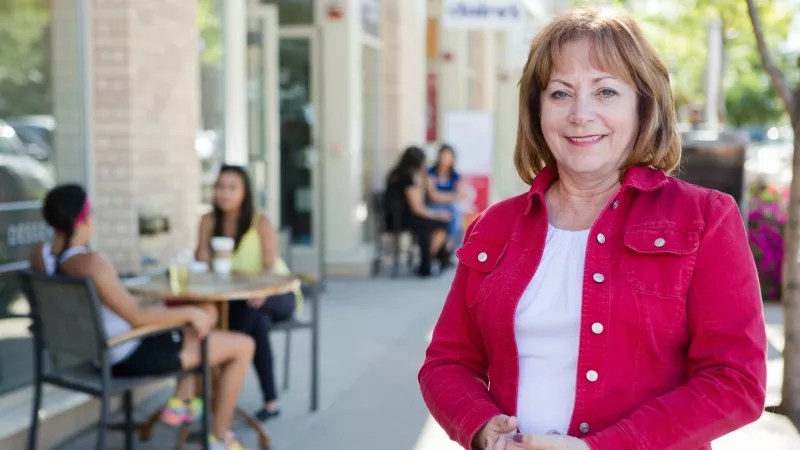
Courtesy of Polis for Colorado

Audio By Carbonatix
Dianne Primavera, who’s running for lieutenant governor alongside Democratic gubernatorial nominee Jared Polis, is a former state representative whose personal experiences as a cancer survivor inspired her to become one of the state’s most passionate health-care advocates.
In November, Polis and Primavera will face off against the Republican tandem of Colorado Treasurer Walker Stapleton and his pick for lieutenant governor, Lang Sias, a state representative for House District 27. We have made repeated requests to interview Sias to multiple members of the Stapleton campaign staff and have yet to receive a single response from any of them. If that changes, we will happily share Sias’s story in this space.
During our conversation with Primavera, she outlines her unusual path toward politics – one that didn’t begin developing until after she’d battled at least three forms of cancer over a span of years. She frankly discusses how the stress of this fight caused her marriage to disintegrate and made the challenge of supporting two daughters on her own even greater.
After that, Primavera talks about her first unsuccessful run for the Colorado House, during which she says she encountered the sort of sexism all too common in electoral politics, as well as subsequent wins and losses. She goes on to detail how she met and got to know Polis and what she hopes to accomplish if the pair wins at the ballot box this fall.
Here’s what she had to say.

Dianne Primavera with her daughters and a friend.
Westword: Where are you from originally? And how did you move toward getting involved in politics?
Dianne Primavera: I’m a Colorado native. Actually, I’m second-generation, my kids are third-generation and my grandbabies are fourth-generation Colorado natives. So Colorado has always been really important to me and my family.
I think I got a call for public service when I was in the fifth or sixth grade, when John Kennedy said, “Ask not what your country can do for you. Ask what you can do for your country.” Being a public servant was something I really aspired to most of my young life.
I spent most of my life before politics working with people with disabilities, to try and help them overcome any of the obstacles they had in life to being successful. I tried to help them find jobs and help them become self-sufficient – that kind of thing.
When I was 38, I had a couple of kids and was as healthy as could be. But one day, I found a lump and went to the doctor and was diagnosed with breast cancer. At that point in time, it was September of 1988 and my little girls were three and five. I was told by every doctor I talked to that I wouldn’t live for five years.
I’ve really walked in people’s shoes who’ve faced terminal illnesses and chronic diseases and tried to navigate the health-care system. During that year when the girls were three and five, I lost my job, I lost my health insurance, and my marriage crumbled under the strain of everything. So I was left – with a terminal illness and wondering if I was going to live or die – to figure out how I could put food on my kids’ table and how I was going to be able to keep a roof over their head.
What kinds of options and supports were available to you at that time?
There really wasn’t much of anything. Thank God I had worked for the state prior to getting sick, because I was able to call my old boss back right away. Really, the support I had in my life were a lot of angels who came out of the woodwork to help me.
I called my boss – his name was Bob Young, and he was a vocational rehabilitation program supervisor with the State of Colorado – and said, “I’m really in a pickle here. I don’t know what I’m going to do. I don’t have a job. I’m raising my kids by myself now. Is there any way you could hire me back to work for the state?” – because the state didn’t have any laws against hiring someone with a pre-existing condition, and I could get health care if I worked for the state. And he said, “Dianne, I have three jobs open right now. Which one do you want?”
He had a rehab supervisor job open in Denver and one in Boulder and I can’t remember where else – and I chose the one in Boulder. And thank goodness I was able to work for the state again, because then I had health care.
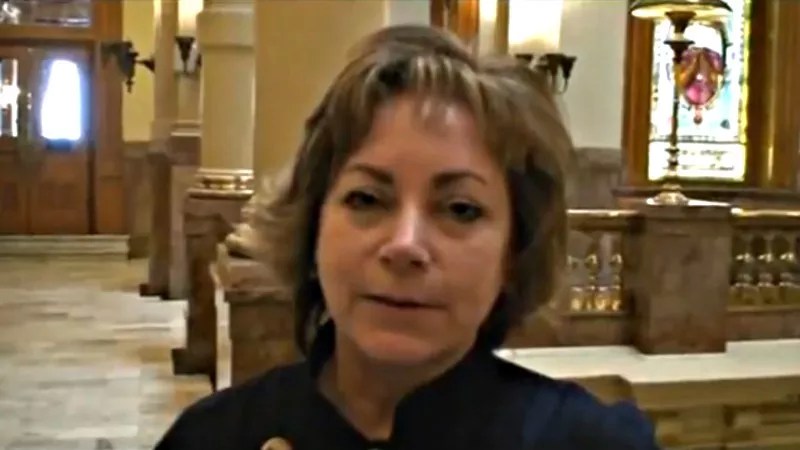
Dianne Primavera at the Capitol circa 2007, during her first stint as a state representative.
How did you manage to outlast that five-year period you supposedly had to live? Was it good fortune? Or was it also good medical care that you were able to access because you had health insurance?
I think it was a combination of a lot of things. I had a really loving father, and I had two little girls who absolutely adored me, and I had wonderful medical care, and I also participated in a clinical trial – and people who participate in clinical trials often have better outcomes with their illnesses.
I did every alternative treatment I could think of aside from visualization therapy. I hunted down a man who was doing research on vitamins and cancer and met him in the basement of his hospital and made him talk to me about what vitamins I should take and things like that. I also got into running, because they say people who do the best in terms of surviving an illness are ones who exercise and who will talk openly about it. So I joined a support group, too. Anything anyone would tell me would help, I did.
When did your diagnosis change? Were you told at a certain point that you were cancer-free?
With breast cancer, you’re never out of the woods. I recently saw that Olivia Newton-John had a recurrence after 25 years. And then I was diagnosed with cervical, squamous cell and basal cancer after that.
When was that?
It was a year after my initial treatment that I got basal, and two years after that, I got cervical. I can’t remember how many years after that I got squamous, but I had that reoccur three or four times.
How did those various health challenges shape you as a person, and also as a future legislator?
I mentioned that I was 38 when I was diagnosed, and I was the picture of health. At that point, I think I had one cavity and my vision was 20-15. I couldn’t understand why, given all that, I was facing the Grim Reaper. I would go into the chemotherapy room with the big leather chairs and see all these people – and I really felt I should be out on the racquetball court instead of being in there getting a chemo drip. So I turned over every rock to figure out “Why me?” And the “Why me?” never really came. After I got my health back, I realized it was really a gift and that I should use that gift to help other people through their struggles.
When I got down to the legislature, I think one of the very first bills I was asked to carry by one of the advocacy groups was the HPV vaccine, which I knew could prevent cervical cancer.
At first, I wanted to run like the wind. I didn’t want to let cancer creep back into my life in any form. I was twenty years out, and that black cloud was finally behind me. But I took on that legislation, and then I can’t tell you the number of bills I took on that were cancer-related after that. I became the cancer champion at the Capitol. And that’s when I finally realized the “Why me?” I realized I could use this gift I’d been given back and use this painful journey to help other people survive.
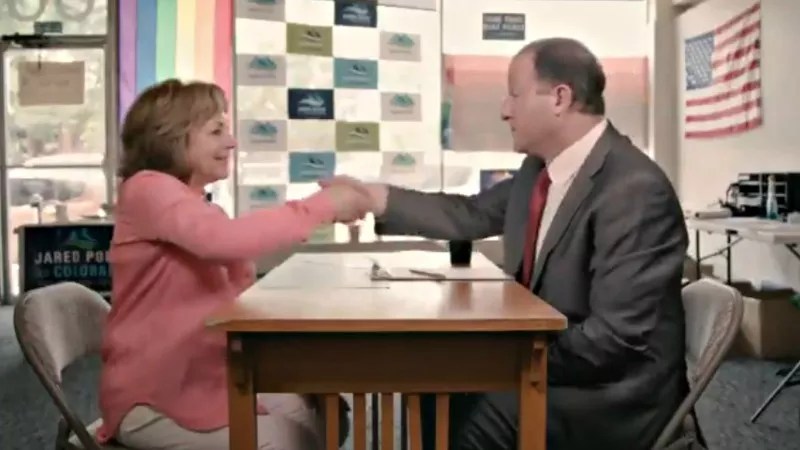
Dianne Primavera and Jared Polis during a “job interview” video shared on social media.
You were elected to represent House District 33 in both 2006 and 2008. What happened in 2010?
Actually, I ran in 2004 as a first-time candidate and lost. I ran in 2006 and won. I won in 2008 and won. I also ran in 2010, but I lost by less than 200 votes. But I ran and won again in 2012 and 2014.
I was never supposed to win initially. My opponent would always introduce me as, “This is Dianne. She’s a little housewife who thinks she wants to get into politics.”
I just decided I would outwork him. I started knocking on doors at nine o’clock in the morning, and I went until nine o’clock at night. I walked in snowstorms, I walked in 100 degree weather. I went through lots of pairs of shoes and lost 35 pounds the first time I ran, just knocking on doors. My campaign staff would have to take me off knocking on doors to get me lunch, because I thought the most important thing I could do was to figure out what was important to voters and be reflective of that when I got down to the Capitol.
I realized when I was at the State Capitol that even though I’d been a patient advocate all my life, I could only help one person at a time when I was their counselor. And as a supervisor, I could help a few hundred people at a time. But at the State Capitol, you can have a positive impact statewide on people’s lives. I always tell people it was the best job I ever had. I felt like I could use that platform and that power, if you will, to make a really positive difference for the people in Colorado.
That was why I was anxious to get back again after losing in 2010, and I did – and I was able to continue my work as a patient advocate.
How did you first meet and get to know Jared Polis?
I think I first met Jared Polis when he was running for the state Board of Education. He and I were both candidates, and I knew he was really passionate about public education. And later, he was my congressperson. I would go to his town meetings and things like that. He would occasionally come to mine and talk about what was happening on the congressional level.
As I got to know Jared, I came to realize how tireless he was in terms of working for the people of the State of Colorado. I admired the fact that he was a self-made person who always put the interests of the Colorado people at the forefront of his mind. So I had a great respect for him. When he called and asked if I would be his running mate, I was really thrilled.
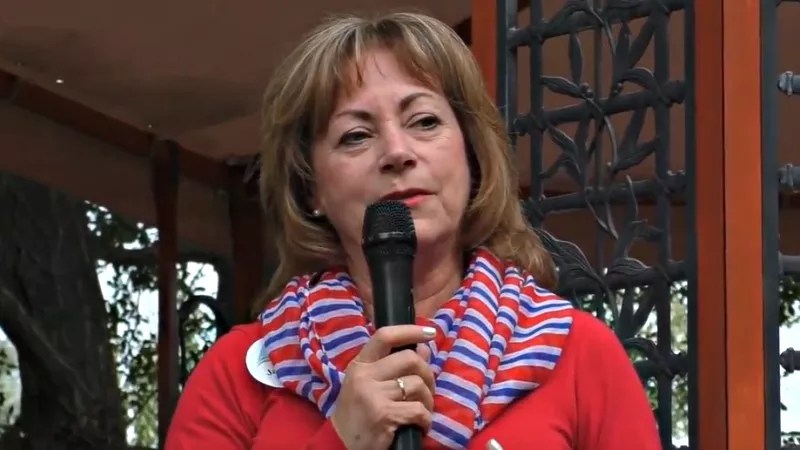
Dianne Primavera during a campaign appearance.
Did the call come out of the blue? Or did you have some inkling he was considering you for this position?
I thought I was going to be working at Susan G. Komen for the long haul. I was term-limited, and I live in an area where I didn’t think I could ever win the Senate seat. I thought my political days were over. But he called me the first part of April and asked if I was interested. He said he’d had lots of people tell him that I would make a really good lieutenant governor. We had several discussions over the next few months, and I also talked with his campaign staff and other advisers. I’m just really honored, because I know Jared had a wide cast of characters he could have picked from that were all very, very talented. The fact that he picked me shows the voters, I think, that he’s really interested in making health care one of his top priorities.
What is your role going to be as the campaign moves forward? Will you be out there frequently, either on your own or alongside Jared Polis?
I think that’s how I won my elections before – just going door to door, listening to people. As a counselor, that’s really what I’d rather do. As a politician, you have to have the microphone in front of you. But we’re going to go to every part of the state we possibly can, listening to voters and trying to figure out what their issues are and taking them back to the Capitol. But because my history has been as a patient and a patient advocate, I know Jared wants me to take a critical role looking at health-care policy.
There are also some things that are proscribed in both the Constitution and in statute that the lieutenant governor is required to do. But I think as we listen to people, my role will continue to be shaped.
Beyond health care, what are some of the issues you see as most important for Coloradans in 2018?
As you mentioned, health care is one of the most important issues. Every Coloradan, regardless of their zip code or their skin color or their employment status, needs to have access to affordable, high-quality health care. Education is also very important. Making sure we have excellent schools with preschool and kindergarten available for every family is really important.
Our environment is really important for me, too. We want to make sure that we protect our public lands. They’re a big part of our economy. We want to create thousands of good, clean-energy jobs. And even though the economy in Colorado is good, there are still plenty of people whose bills are rising, and we need to make sure they have good paying jobs in all parts of the community that keep ahead of the cost of living and allow them to work and retire comfortably. When I was at the Capitol, I worked on the Strategic Action Plan for Aging. That was one of my bills, and I wanted to help senior citizens on their fixed incomes. Some of them were forced to live in their cars, and that just shouldn’t happen to people who’ve worked all their lives.
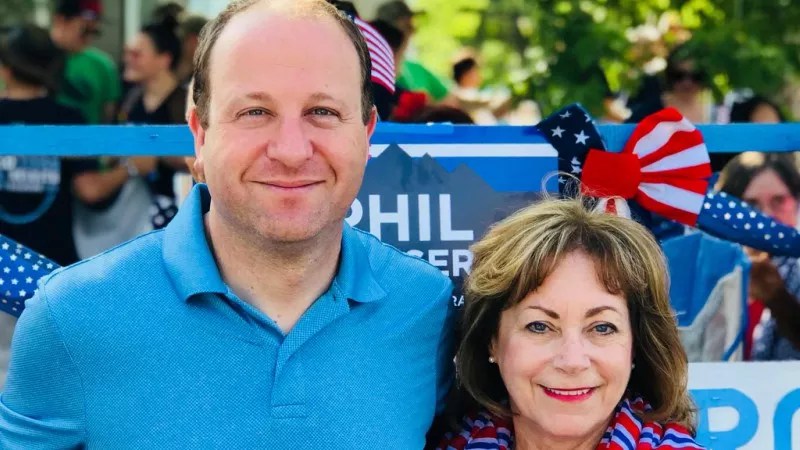
Jared Polis and Dianne Primavera at the Greeley Independence Day parade.
The Walker Stapleton campaign is already trying to paint Jared Polis as too extreme for Colorado – a phrase that’s been used in past elections by candidates on both sides of the aisle. What’s your response to people who see him as outside the mainstream of Colorado and just too liberal?
You know, he has a terrific voting record, and it’s really no more liberal than someone like Ed Perlmutter. The issues that Jared and I are interested in moving on pertain to every Coloradan, not just the liberals or the conservatives. It’s more about whether we move Colorado forward instead of backward. So we’re really more focused on pocketbook issues that affect all of us….
If you have your health, you have everything. It doesn’t matter if you’re a Democrat or a Republican. The issues Jared and I are working on really affect everybody.
If Jared Polis is elected governor and you’re elected lieutenant governor, what roles do you see yourself performing – including the ones that, as you mentioned, are proscribed by the Constitution?
The lieutenant governor by Constitution is in charge of the Commission on Indian Affairs – making sure that people from the different tribes are considered in all of our public policy. The Aerospace Commission is another one that’s in statute. And the lieutenant governor also has a major role in Americorps and other volunteer opportunities. So those are the kinds of things that are actually proscribed. And then it would be up to Jared and I to determine what other roles he’d like me to play.
Is your hope that one of those additional roles would be related to health care?
Absolutely. That’s really the strongest aspect that I bring to the ticket – both my personal story as a patient and my lifelong passion to make sure that people have access to quality health care.
What is your pitch to Colorado voters as to why you and Jared Polis should earn their vote in November?
I think together, Jared and I are really passionate about helping Coloradans. We want to build an economy where everybody has the opportunity to get ahead, and everybody can get ahead. We want there to be affordable health care for every family, a great education for every child. And we really need to focus on good-paying jobs that stay ahead of the cost of living.